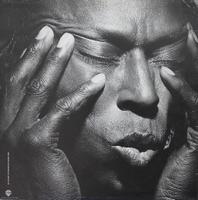 This is not for the light hearted. The blurb on the jacket says that Miles Davis tells it like it is, pulling no punches. That’s for sure. Every page seemed to have either the words shit, fuck or motherf…..written on it. The book almost reminded me of the original edition of Joan Collins’ autobiography – at the height of her The Bitch and The Stud fame – where she peppered her prose with lots of blue language. (She edited out all the bad language on the following editions I believe, when she became famous for Dynasty.) Having said that, I think I got used to, or inured to, all the shits and fucks and mothers in Miles’ autobiography by the end.
This is not for the light hearted. The blurb on the jacket says that Miles Davis tells it like it is, pulling no punches. That’s for sure. Every page seemed to have either the words shit, fuck or motherf…..written on it. The book almost reminded me of the original edition of Joan Collins’ autobiography – at the height of her The Bitch and The Stud fame – where she peppered her prose with lots of blue language. (She edited out all the bad language on the following editions I believe, when she became famous for Dynasty.) Having said that, I think I got used to, or inured to, all the shits and fucks and mothers in Miles’ autobiography by the end.You read the autobiographies of great artists at your own peril. They don’t give any clue as to how the music is made (the reason I picked up Miles autobiography is because recently I’ve really become obsessed with his 1970 double album Bitches Brew). And frequently, I find, artists don’t paint very flattering self-portraits. Part of the problem might be that (in the case of musicians at least) they are not writers. Writers can lie more easily about themselves, as they have all those literary tools there. But musicians tend to give too much ugly reality.
Miles Davis finds himself in the same boat. Describing his early days playing with Charlie "Bird" Parker, he admits to not really liking the man at all. There’s quite a few other musicians that Davis is not fond of either, even finding time to have a go at Louis Armstrong for his pandering to white audiences (uncle tomming).
Feminists and others concerned about the status of women will also be unimpressed by Miles’ treatment of women. He freely admits to slapping and beating many of his wives and lovers over the years. He’s not exactly into fidelity either.
All in all he comes across as a pretty scary, angry man, who’d tell you exactly what he thought of you. A lot of his anger comes from the way black people are treated in America. There is a lot of criticism in this book of whites, especially of how when white people take up jazz, they get lauded to the skies, yet the blacks who invented Jazz never get any credit. Miles says he gets more respect when he travels to Europe or Asia than he does in his own country.
Another reason I read this book was because I knew there were parts about Prince. I was not disappointed. I’d always presumed (call me a starry eyed fan) than Prince would be a nice person. He has written too many songs with genuine humanitarian concerns. Happily Miles described him as ‘very nice, a shy kind of person.’ I also loved Miles’ description of Prince’s music:
" He’s got that church thing up in what he does. He plays guitar and piano and he plays them very well. But it’s the church thing that I hear in his music that makes him special, and that organ thing. It’s a black thing and not a white thing. Prince is like the church to gay guys. He’s the music of the people who go out after ten or eleven at night"
This is not an entirely enjoyable read, but somehow essential for music and jazz lovers. He knew and worked with so many important people, created so much amazing music (especially the extraordinary, seminal Bitches Brew). Alas, the people behind the great music tend to be a bit disappointing. But I guess that’s more the fan’s problem, not allowing their idols to be human.
I should also end here by thanking Miles Davis for all the music he has left us - otherwise his ghost might come to haunt me.
No comments:
Post a Comment